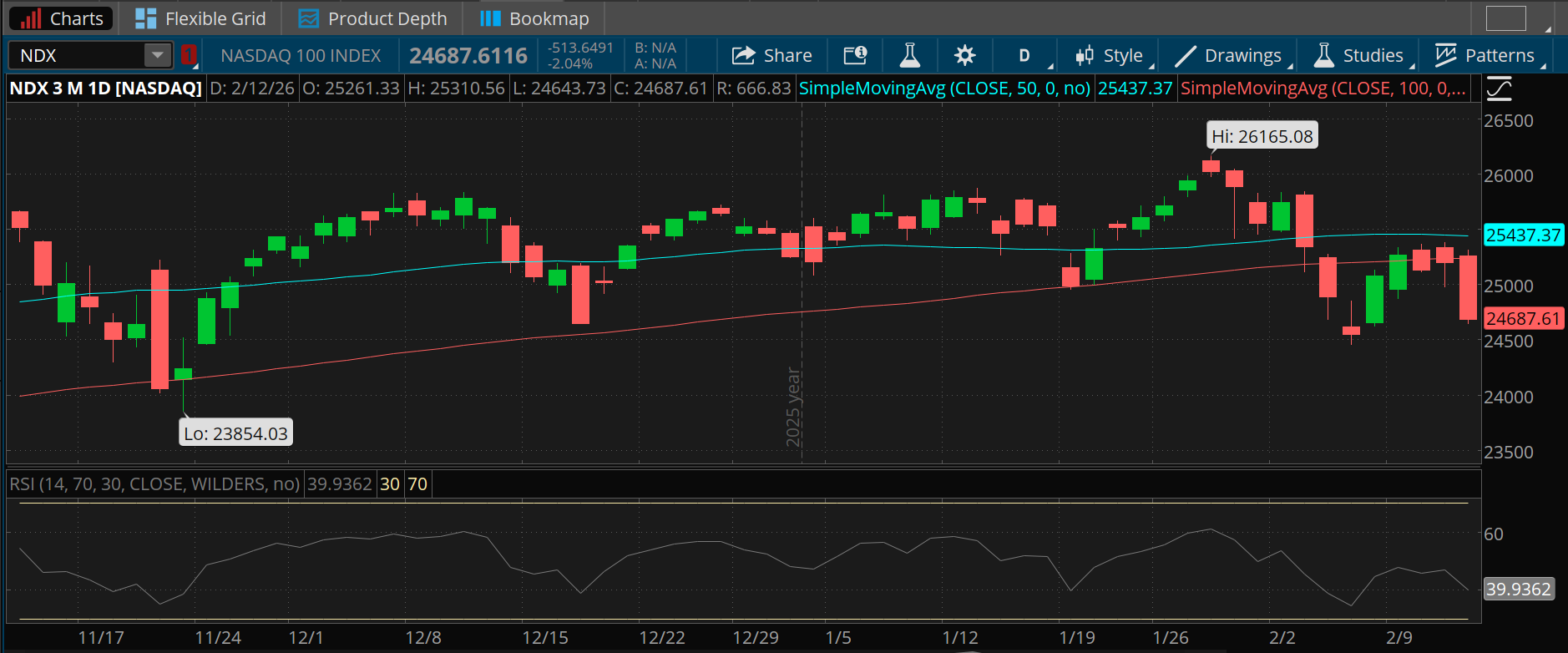Major Indexes Pare Losses as January CPI is Muted

Published as of: February 13, 2026, 9:12 a.m. ET
Listen to this update
Listen here or subscribe to the Schwab Market Update in your favorite podcast app.
| The markets | Last price | Change | % change |
|---|---|---|---|
| S&P 500® Index | 6,832.76 | -108.71 | -1.57% |
| Dow Jones Industrial Average® | 49,451.98 | -669.42 | -1.34% |
| Nasdaq Composite® | 22,597.15 | -469.32 | -2.03% |
| 10-year Treasury yield | 4.09% | -0.01 | -- |
| U.S. Dollar Index | 97.03 | +0.10 | +0.10% |
| Cboe Volatility Index® | 20.85 | +0.03 | +0.24% |
| WTI Crude Oil | $63.01 | +$0.19 | +0.30% |
| Bitcoin | $67,465 | +$1,965 | +3.00% |
(Note to readers: U.S. markets are closed Monday, February 16, in observance of the U.S. President's Day holiday. The Schwab Market Update will return on Tuesday, February 17.)
(Friday market open) Major indexes pared losses early today and briefly turned green after January's Consumer Price Index (CPI) came in slightly milder than expected. Headline CPI rose 0.2%, below the 0.3% average estimate, while core CPI—which excludes food and energy—rose 0.3%, in line with consensus. Headline CPI rose 2.4% year over year, the lowest since May and slightly below the expected 2.5%.
"This should be well received by those on the Fed worried about sticky inflation," said Collin Martin, head of fixed income research and strategy at the Schwab Center for Financial Research, or SCFR. "This shouldn't change the near-term path of Fed policy, with the Fed likely to stay on hold for a few more meetings, but more releases like this might get more officials on board for cuts later this year."
Beyond CPI, data and earnings today are sparse and trading may thin ahead of the three-day holiday weekend. The question is whether participants cover any short positions after Thursday's sell-off or rediscover their passion to "buy the dip" that proliferated earlier this year. Worries persist that AI substitution could hurt many white-collar businesses. It began about a month ago when underperformance in software stocks shifted into higher gear, then spread beyond software this week. A "sell first, then assess later" theme has developed, said Liz Ann Sonders, chief investment strategist at SCFR, and the S&P 500 Index is on pace for its second straight losing week. The tech-heavy Nasdaq-100® (NDX) is likely headed for its third, with next week bringing a first official estimate of fourth quarter gross domestic product (GDP) growth and minutes from the Federal Reserve's last meeting.
To get the Schwab Market Update in your inbox every morning, subscribe on Schwab.com.
Three things to watch
- CPI deeper dive: Annual CPI of 2.4% in January was down from 2.7% the prior two months, while core rose 2.5%, down from 2.6% in December. The relatively cool January numbers came in contrast to recent Januarys when CPI rose much more than analysts had predicted, possibly due to seasonal effects not smoothed out by statisticians. One thing to keep in mind about today's data is that some of it reflects the so-called "base effect" in which inflation growth looks relatively mild thanks to high readings a year earlier. Treasury yields fell following the release, with the 10-year initially dipping to 4.07%, its lowest level since early December. "While this is a step in the right direction, we'll want to see a few more months of data like this to be more confident that inflation is actually resuming its downward trend back towards 2%," my colleague Martin said. Next week brings December Personal Consumption Expenditures (PCE) price index, the Fed's favored inflation indicator and one that might be influenced by high readings in the recent Producer Price Index (PPI). While core CPI fell to 2.4%, the last few months have seen increases of 0.2% and 0.3%, which still suggests the near-term trend is above the Fed's 2% target.
- Criminal case versus Powell likely to end soon: President Trump's nomination of Kevin Warsh to succeed Jerome Powell as Federal Reserve chairman faces a roadblock in Congress as North Carolina Republican Sen. Thom Tillis vows to prevent any consideration of Fed nominees until the administration's criminal investigation of Powell ends. The end could come relatively quickly now that another Republican Senator, South Carolina's Tim Scott—who chairs the Senate Banking Committee that heard Powell's testimony on the Fed headquarters renovation last year that's the focus of the investigation—said he's convinced Powell committed no crimes. This could be part of a coordinated and pre-planned effort to begin winding down the investigation, though Trump said he's determined to let it play out, however long it takes. "I would not be surprised if there is an announcement sometime in the next few weeks that the investigation is complete and that no charges are filed," said Michael Townsend, managing director of legislative and regulatory affairs at Schwab, in his newest WashingtonWise podcast. "That should then clear the way for Warsh's confirmation and for him to take office in mid-May and to run his first policy meeting as chair in June."
- International stocks still outpace U.S.: Recent pressure on tech stocks related to sector rotation and AI demand worries is playing out beyond the borders as overseas markets continue their recent superior performance. The MSCI EAFE Index (MXEA), which includes large- and mid-cap stocks across 21 developed markets excluding the U.S. and Canada, was ahead of the S&P 500 Index by 700 basis points year-to-date by the middle of this week. "Developed market international stocks are benefitting from higher weights in industrials and financials, and less in tech than in the U.S.," said Michelle Gibley, director of international equity research and strategy at SCFR. "It's not just U.S. investors looking to diversify—it can also be seen in foreign investors hedging exposure to the U.S. dollar." Over time, international stocks may be a beneficiary of geopolitical fracturing but could be subject to related volatility. Lasting implications include "potentially higher inflation, more frequent supply shocks, and increased bouts of market volatility over the longer term," Gibley wrote in a recent analysis.
On the move
- Airbnb (ABNB) climbed more than 5% early today after quarterly revenue surpassed expectations and guidance looked positive.
- Arista Networks (ANET) added 10% in early trading following the company's report of strong fourth quarter revenue growth and gross margins, along with solid guidance. Two Wall Street firms raised their price targets.
- DraftKings (DKNG) stumbled more than 17% early Friday despite earnings and revenue topping consensus. The trouble came with guidance as the sports betting firm's revenue expectations for the year came in well below Wall Street's.
- Roku (ROKU) climbed 15% after getting upgraded to Buy from Neutral at Rosenblatt, which noted that the company "handily beat" fourth quarter estimates and provided better-than-expected guidance for this quarter and year that looks "beatable again."
- Applied Materials (AMAT) was up more than 10% early today as earnings and revenue both came in above analysts' expectations. Summit Insights and Craig-Hallum upgraded Applied Materials to Buy from Hold, and several analysts raised price targets.
- Coinbase (COIN) jumped more than 5% in early trading following its report of solid trading volume in 2025 along with improved subscription and services revenue.
- Expedia (EXPE) declined 6% ahead of the open today as worries grew about possible AI-powered competition. The company's earnings beat expectations.
- Rivian Automotive (RIVN) zoomed up more than 20% early today after reporting a narrower-than-expected fourth quarter loss and higher-than-expected revenue. The EV company also sees 47% to 59% vehicle delivery growth year over year in 2026.
- The S&P 500 Index remains stuck in its near-term range between 6,500 and 7,000 and suffered a technical blow Thursday when it closed well below its 50-day moving average of 6,894. The 100-day moving average near 6,811 is now just beneath current market levels. The index closed just two points above that on February 5 but hasn't settled below it in almost a year.
- Baxter International (BAX) toppled almost 16% Thursday on earnings that missed expectations and below-consensus guidance.
- Shares of steel makers Nucor (NUE) and Cleveland-Cliffs (CLF) dropped more than 4% and 3%, respectively, early today after The Financial Times reported that President Trump plans to roll back tariffs on steel and aluminum products.
- Pinterest (PINS) plunged 22% this morning after earnings missed Wall Street's expectations and guidance failed to impress.
- Every Magnificent Seven stock declined Thursday, extending a long soft streak. Amazon has dropped eight sessions in a row since the day its earnings came in short of expectations.
- Home builders rose Thursday as Treasury yields fell.
- Apple (AAPL) fell 5% Thursday, its worst day since April, as the Federal Trade Commission (FTC) announced it would investigate how Apple promotes news articles on its site. Another pressure point was Bloomberg's report yesterday that the long-planned Siri upgrade ran into snags, potentially pushing back the release of some functions.
- The 10-year note Treasury note yield fell sharply to 4.1% Thursday, the first time it's been that low since December 5. It fell below 4.1% this morning. Strong demand for a 30-year bond auction and weak existing home sales appeared to help Treasuries, which move the opposite direction of yields.
- The Cboe Volatility Index (VIX) rose 18% yesterday to again top 20 as stocks sold off. VIX futures remain in contango with contracts for future months trading at a premium to the spot price, implying investors expect volatility to rise from here.
- Bitcoin (/BTC) edged up 3% this morning but remains near its lows for the week and on pace to close down from last Friday.
More insights from Schwab

Schwab assesses recent market moves: In their new article, Schwab's team of experts looked at the stock market's recent action, fourth quarter earnings, the bond market, and economic activity and offer helpful analysis so investors can understand what's driving prices.
Assessing AI shock: In their latest On Investing podcast, Schwab's Sonders and Kathy Jones, chief fixed income strategist at SCFR, discussed the recent trend where AI-related headlines fuel sharp market rotations, including in the financial sector. "These sector rotations are happening fast and furiously," Sonders said, noting that "panic in the face of these rapid-fire shifts and rotations doesn't make a lot of sense."
In-the-money versus out in vertical spread trading: In Schwab's latest options trading primer, learn how in-the-money or out-of-the-money options can influence risk, reward, liquidity, and time decay when trading vertical spreads.
Chart of the day

Data source: Nasdaq. Chart source: thinkorswim® platform.
Past performance is no guarantee of future results.
For illustrative purposes only.
The Nasdaq-100 (NDX—candlesticks) is down for the year and has remained below its 50-day (blue line) and 100-day (red line) moving averages for several sessions in a row. It's relative strength index of 39 (bottom chart) is near early-February lows.
The week ahead
Check out the investors' calendar for a summary of the top economic events and earnings reports on tap this week.
February 16: U.S. markets closed for President's Day.
February 17: Expected earnings from Medtronic (MDT), Constellation Energy (CEG), and Palo Alto Networks (PANW).
February 18: January housing starts and building permits, January industrial production, FOMC meeting minutes, and expected earnings from Analog Devices (ADI), Booking Holdings (BKNG), Carvana (CVNA), DoorDash (DASH), Occidental Petroleum (OXY), and eBay (EBAY).
February 19: January pending home sales and expected earnings from Walmart (WMT), Alibaba (BABA), Deere (DE), Southern (SO), and Newmont (NEM).
February 20: December personal income and personal spending, December PCE prices, Q4 GDP advance estimate, and final February University of Michigan Consumer Sentiment.